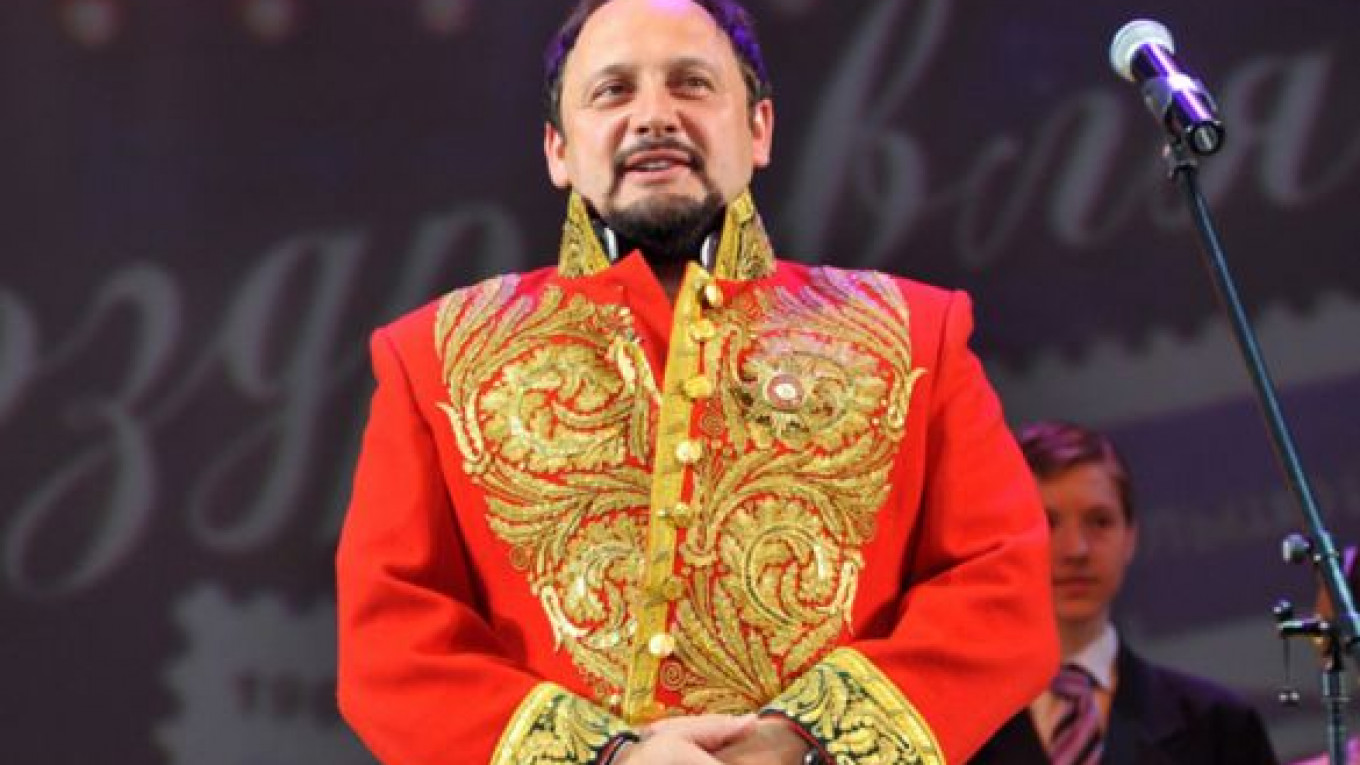When a picture of a bespectacled man with a goatee, standing alongside the country’s President Vladimir Putin with a placard “Honored Artist of Russia” was posted on Facebook over the weekend, some people started to ask who the man is.
Ironically, while he is not a poster child for the Facebook audience, Stas Mikhailov, 43, is one of the most popular Russian crooners, whose albums of simple love songs are enjoyed by thousands of women nationwide.
In 2011, Mikhailov reached the top place among Russia’s show business earners with a $20 million annual income, according to Forbes magazine. Despite this, his music is often labeled cheesy and remains a symbol of bad taste for many critics, who have labeled Mikhailov a “restaurant singer.”
The singer, however, prefers to describe himself as a self-made man who achieved his success through faith in God.
“In the 1990s, I was in crisis and lived in poverty. I was drinking and felt sorry for myself. But I was able to overcome it because of heaven,” Mikhailov said in an interview with a St. Petersburg newspaper in 2008.
The picture of Mikhailov with Putin was taken during Friday’s ceremony at the Kremlin when the singer received the prestigious title “Honored Artist of Russia.”
Some critics raised eyebrows when Mikhailov was honored in a ceremony along with more than 50 other Russians, including a naval commander and a schoolgirl from Ingushetia who saved her small brother from the rebels’ bullets in October. Zalina Arsanova, who was wounded but survived, received a medal from the president.
As it turned out, Mikhailov was supposed to be awarded his title almost two years ago, during the presidency of Dmitry Medvedev, who signed the relevant decree, Izvestia reported Friday.
The newspaper gave no explanation as to why the ceremony was delayed, but it reported that the flamboyant nationalist politician Vladimir Zhirinovsky was pushing hard to give Mikhailov a title.
“It is strange that it didn’t happen earlier,” Kommersant music critic Boris Barabanov said.
He added that by giving Mikhailov an award, Putin was sending a message to his electoral base.
“They have the same fans: women over 40 and those who like to watch TV,” Barabanov said.
Anton Chernin, editor-in-chief of the Moscow FM English-language station, said that while Mikhailov’s macho appearance is liked by “single women,” the quality of many of his tunes shows that the median performing level of Russian singers has largely declined.
But he also added that the fact that Mikhailov sings live helps his popularity.
“People miss when the singers sing live,” Chernin said.
Mikhailov, who is scheduled to perform at the Kremlin Palace in the middle of March, also recently made headlines by appearing at a Duma hearing last week alongside fellow crooner Grigory Leps and pop singer Valery Meladze.
The crooners were demanding passage of amendments to the Civil Code that will help them to protect their privacy, which is often violated by the tabloid press. They also said they want to force the media to disclaim any information they consider harmful for their well-being.
The proposed amendments have prompted a negative response from editors as well as one member of the presidential council on human rights, Irina Khakamada, who said they could be used to target reporters investigating corruption or office abuse.
It seemed that Mikhailov’s entourage was already instructed to be tough with reporters. During the ceremony at the Kremlin, a journalist who was trying to ask Mikhailov for a comment about his Duma campaign was threatened by his bodyguard, who calmed down only after being addressed by the Federal Guard Service, Moskovsky Komsomolets reported.
Media critics said Mikhailov’s angry moods were prompted by a recent comedy sketch in which popular comic Alexander Revva portrayed Mikhailov in a grotesque way. The comedy “Dubler” (Double) shows a mustachioed, long-haired singer called Mikhail Stasov, who in the film admits to spending half of his day in the shower and the spa.
Mikhailov filed a lawsuit demanding 30 million rubles ($986,000) from the filmmakers, claiming that they had violated his rights to his own image. But a victory in court would be hard to achieve, legal experts said.
Contact the author at a.bratersky@imedia.ru
A Message from The Moscow Times:
Dear readers,
We are facing unprecedented challenges. Russia's Prosecutor General's Office has designated The Moscow Times as an "undesirable" organization, criminalizing our work and putting our staff at risk of prosecution. This follows our earlier unjust labeling as a "foreign agent."
These actions are direct attempts to silence independent journalism in Russia. The authorities claim our work "discredits the decisions of the Russian leadership." We see things differently: we strive to provide accurate, unbiased reporting on Russia.
We, the journalists of The Moscow Times, refuse to be silenced. But to continue our work, we need your help.
Your support, no matter how small, makes a world of difference. If you can, please support us monthly starting from just $2. It's quick to set up, and every contribution makes a significant impact.
By supporting The Moscow Times, you're defending open, independent journalism in the face of repression. Thank you for standing with us.
Remind me later.






